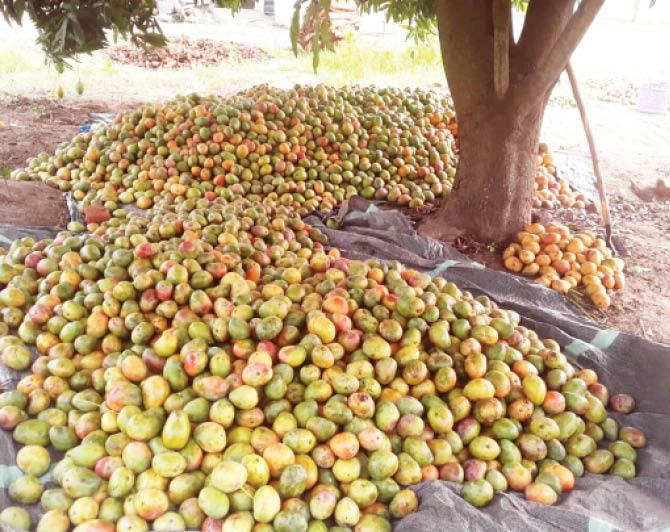Adi Etum, a new resident of Makurdi, stocks his fridge every week with different varieties of mangoes he buys from the metropolitan railway market where fresh fruits are sold in abundance.
He said, “Since I came to Makurdi about a month ago, no day passes without me consuming at least three different varieties of mangoes. I haven’t seen the varieties of mangoes found in Benue in any of the states where I have worked.
“The species of mangoes here (Benue) are not just big but delicious. The mangoes here are filling when eaten; I can’t just have enough of it. And that’s why I visit the railway fruit market every week to purchase fresh ones and stock in the fridge.”
Etum is among many others who are in love with Benue mango, especially now that the different varieties are in season.
Indeed, Benue State’s mango season showcases an abundance of varieties, particularly in Ushongo Local Government Area which prides itself as the home of citrus, and possesses more varieties of mango than the other parts of the state.
The common mango varieties include Johnbull, Brokin, Peter, Julie, Dawshia, Hindi, Mummy, Tommy, Lick, Palms and Keith.
Despite this richness, much of the fruit goes to waste annually due to inadequate preservation methods at its peak of production, usually between March and May, every year, thereby depriving lovers of the perishable fruit maximum consumption for health, cosmetics and other benefits contained in it.
Entrepreneurs like Paul Osakwe of Green Source Farm Limited are however tapping into the potential of mangoes, producing value-added products like crispy mango chips.
Osakwe said, “It’s marketable, it’s just that it (Mango) is costly now. We are considering export. The challenge now is the increased cost of the commodity and production.”
Coordinator of Nigerian Export Promotion Council (NEPC) in Benue State Coordinating Office, Olu Ikulajolu, told our correspondent that the Council would ensure the exportability of mango from the state.
“Benue has mango in abundance and we are making effort to develop it for export. Some people are already exporting Mango but not from Benue State. They are taking Nigerian mango to Dubai, UK and Benue has it in abundance. So definitely, it’s worth developing for export,” Ikulajolu said.
It would be recalled that the NEPC has urged Small and Medium-sized Enterprises (SMEs) to take advantage of the African Continental Free Trade Area (AfCFTA) to access foreign markets and boost their businesses.
The NEPC’s Assistant Director, Policy & Strategy Department, Aliyu Sadique, had in the past intimated that the council has to find products for its export either for the African Continental or European market.
He had said, “it is the same tool we want to deploy to our exporters. We train and equip them with knowledge and skills. There are series of exportable products in Benue such as yam, sesame and mango which can do well in the international market for export readiness market.”
Dr Sylvester Adejo, also in a previous interview with our correspondent highlighted the nutritional benefits and diverse uses of mangoes, urging for more efforts to curb post-harvest losses and enhance the state’s agricultural value chain.
Adejo, a Deputy Director of Research and Collaboration, Centre for Food Technology and Research (CEFTER), African Centre of Excellence for Control of Post Harvest Losses at the Benue State University (BSU) Makurdi, harped on the nutritional richness of mangoes, emphasising its role in promoting vision health and protecting against various cancers.
He also explored the versatile uses of mangoes, from dried snacks to culinary ingredients, noting that mango fruit is an excellent source of vitamin A and flavonoids like beta carotene, beta-cryptexanthia, as well as rich in pro-biotic dietary fibre, among others.
He added that those compounds have antioxidant properties and are essential for vision, while the vitamin A component helps in maintaining healthy sight and skin. The fruit is also rich in carotene which protects one against lung and cavity cancer.
Apart from that, the fruit, he said, has been found to protect against leukemia, colon, breast and prostate cancer.
Adejo further posited that mango can be processed into different forms and products such as dried mango confectionery, dried mango chips and food ingredients like green mango in brine or vinegars for processing jams, fruit juice concentrate, marmalades, jellies, mango powder and mango leathers, among others.
Mangoes also have non-food uses according to Adejo, who explained that the peels are a source of anacardic acid, the bark are source of tannin for curing of leather, the seed oil is used for the production of cosmetics while the kernel is used for extraction of starch for animal feed production.
But all of these are yet to become reality in Benue in order to curb wastage and enhance its market value which is often affected if the fruit receives any slight injury during picking, packaging and stocking in transit or on retail display.

 Join Daily Trust WhatsApp Community For Quick Access To News and Happenings Around You.
Join Daily Trust WhatsApp Community For Quick Access To News and Happenings Around You.


